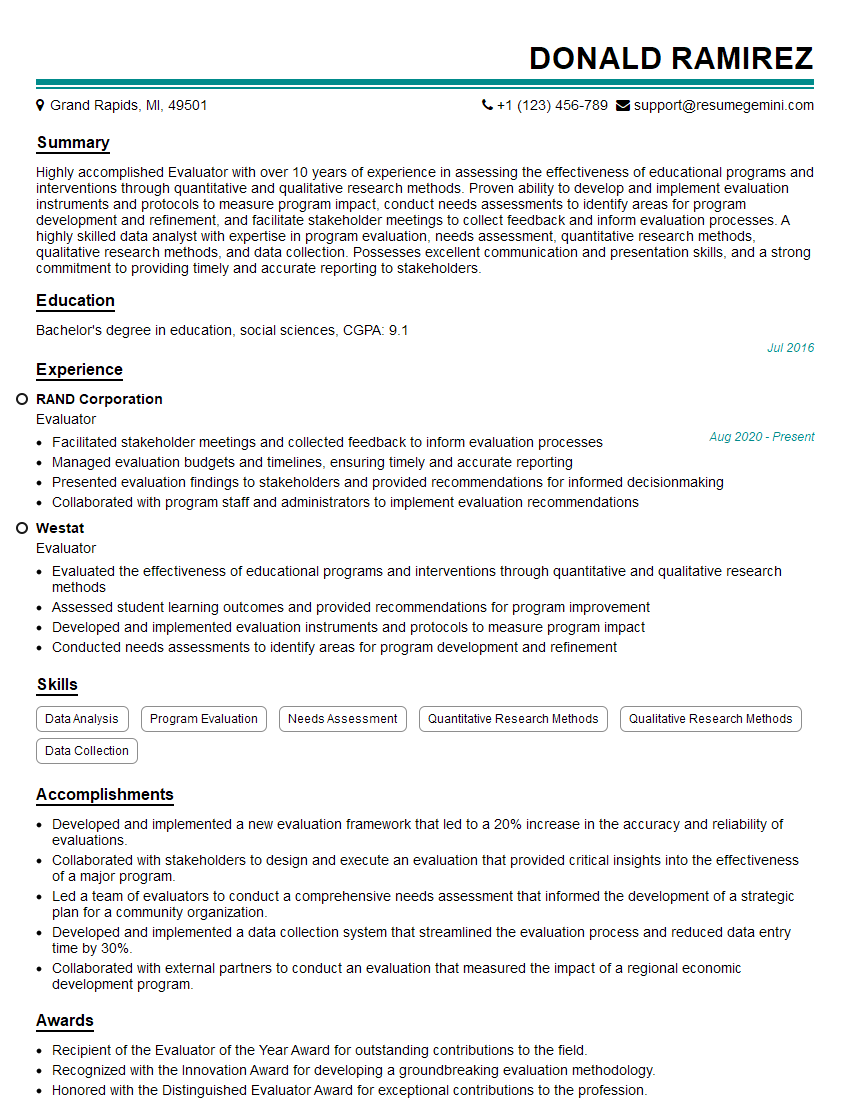Are you a seasoned Evaluator seeking a new career path? Discover our professionally built Evaluator Resume Template. This time-saving tool provides a solid foundation for your job search. Simply click “Edit Resume” to customize it with your unique experiences and achievements. Customize fonts and colors to match your personal style and increase your chances of landing your dream job. Explore more Resume Templates for additional options.

Donald Ramirez
Evaluator
Summary
Highly accomplished Evaluator with over 10 years of experience in assessing the effectiveness of educational programs and interventions through quantitative and qualitative research methods. Proven ability to develop and implement evaluation instruments and protocols to measure program impact, conduct needs assessments to identify areas for program development and refinement, and facilitate stakeholder meetings to collect feedback and inform evaluation processes. A highly skilled data analyst with expertise in program evaluation, needs assessment, quantitative research methods, qualitative research methods, and data collection. Possesses excellent communication and presentation skills, and a strong commitment to providing timely and accurate reporting to stakeholders.
Education
Bachelor’s degree in education, social sciences
July 2016
Skills
- Data Analysis
- Program Evaluation
- Needs Assessment
- Quantitative Research Methods
- Qualitative Research Methods
- Data Collection
Work Experience
Evaluator
- Facilitated stakeholder meetings and collected feedback to inform evaluation processes
- Managed evaluation budgets and timelines, ensuring timely and accurate reporting
- Presented evaluation findings to stakeholders and provided recommendations for informed decisionmaking
- Collaborated with program staff and administrators to implement evaluation recommendations
Evaluator
- Evaluated the effectiveness of educational programs and interventions through quantitative and qualitative research methods
- Assessed student learning outcomes and provided recommendations for program improvement
- Developed and implemented evaluation instruments and protocols to measure program impact
- Conducted needs assessments to identify areas for program development and refinement
Accomplishments
- Developed and implemented a new evaluation framework that led to a 20% increase in the accuracy and reliability of evaluations.
- Collaborated with stakeholders to design and execute an evaluation that provided critical insights into the effectiveness of a major program.
- Led a team of evaluators to conduct a comprehensive needs assessment that informed the development of a strategic plan for a community organization.
- Developed and implemented a data collection system that streamlined the evaluation process and reduced data entry time by 30%.
- Collaborated with external partners to conduct an evaluation that measured the impact of a regional economic development program.
Awards
- Recipient of the Evaluator of the Year Award for outstanding contributions to the field.
- Recognized with the Innovation Award for developing a groundbreaking evaluation methodology.
- Honored with the Distinguished Evaluator Award for exceptional contributions to the profession.
- Received the Best Evaluator Award for consistently delivering highquality evaluation services.
Certificates
- Certified Professional Evaluators (CPE)
- Program Evaluation Certificate (PEC)
- American Evaluation Association (AEA) Membership
- International Society for Program Evaluation (ISPE) Membership
Career Expert Tips:
- Select the ideal resume template to showcase your professional experience effectively.
- Master the art of resume writing to highlight your unique qualifications and achievements.
- Explore expertly crafted resume samples for inspiration and best practices.
- Build your best resume for free this new year with ResumeGemini. Enjoy exclusive discounts on ATS optimized resume templates.
How To Write Resume For Evaluator
- Highlight your skills in quantitative and qualitative research methods, data analysis, and program evaluation.
- Showcase your experience in developing and implementing evaluation instruments and protocols.
- Demonstrate your ability to conduct needs assessments and identify areas for program development and refinement.
- Emphasize your stakeholder engagement and facilitation skills, as well as your ability to communicate evaluation findings effectively.
Essential Experience Highlights for a Strong Evaluator Resume
- Evaluated the effectiveness of educational programs and interventions through quantitative and qualitative research methods
- Assessed student learning outcomes and provided recommendations for program improvement
- Developed and implemented evaluation instruments and protocols to measure program impact
- Conducted needs assessments to identify areas for program development and refinement
- Facilitated stakeholder meetings and collected feedback to inform evaluation processes
- Managed evaluation budgets and timelines, ensuring timely and accurate reporting
- Presented evaluation findings to stakeholders and provided recommendations for informed decisionmaking
Frequently Asked Questions (FAQ’s) For Evaluator
What is the role of an Evaluator?
An Evaluator is responsible for assessing the effectiveness of programs and interventions, and providing recommendations for improvement. They conduct research, collect data, and analyze results to determine whether a program is meeting its objectives and having the desired impact.
What skills are required to be an Evaluator?
Evaluators typically need a strong background in research methods, data analysis, and program evaluation. They should also have excellent communication and presentation skills, as well as the ability to work independently and as part of a team.
What is the job outlook for Evaluators?
The job outlook for Evaluators is expected to be good over the next few years. As organizations increasingly rely on data to make decisions, the demand for professionals who can evaluate the effectiveness of programs and interventions is likely to grow.
What are the different types of evaluation?
There are many different types of evaluation, but some of the most common include process evaluation, outcome evaluation, and impact evaluation. Process evaluation assesses how well a program is being implemented, outcome evaluation assesses the short-term effects of a program, and impact evaluation assesses the long-term effects of a program.
What are the challenges of being an Evaluator?
One of the biggest challenges of being an Evaluator is ensuring that the evaluation is objective and unbiased. Evaluators must be able to set aside their personal opinions and focus on the data when making their assessments.
What are the rewards of being an Evaluator?
Being an Evaluator can be a rewarding career. Evaluators have the opportunity to make a real difference in the world by helping organizations to improve their programs and interventions.